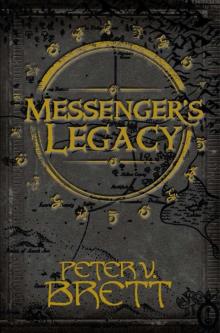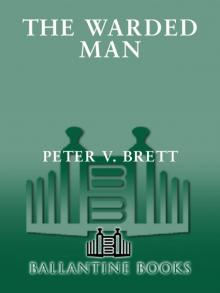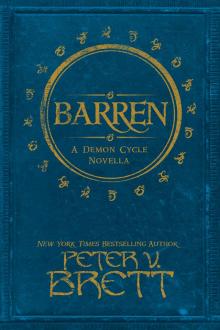- Home
- Peter V. Brett
Brayan's Gold Page 4
Brayan's Gold Read online
Page 4
“The sun shines at last,” Arlen said.
“Tub’s over there,” Derek said, pointing to a smooth depression in the stone floor beneath a heavy pump. “Pump’s attached to a heated reservoir. Soak as long as you like and then come out for supper.”
Arlen nodded, and the keeper left. He meant to take his armor off and get in the bath, but he fell back on the mattress for a moment, savoring its soft support, and found he didn’t have the strength to rise. He closed his eyes, and fell dead asleep.
Arlen eventually made it out of his armor and over to the bath. Working the pump to fill the tub woke him back up, but the hot soak threatened to put him right out again. It was only the insistent growl of his stomach that made him pull on his clothes and stumble out of his room, feeling practically weightless without his armor.
“Derek?” he called.
“In the kitchen!” he heard the keeper reply. “Follow your nose!”
Arlen sniffed the air, and the growl in his stomach became a roar. His nose led him swiftly to the kitchen, where he found Derek wearing an apron and thick leather gloves as he bustled about.
“Sit,” the keeper told Arlen, pointing to the closest stool at an oval table at the room’s center, large enough for a score of men to eat at once. “Supper will be ready in a moment. You feeling human again?”
Arlen nodded as he sat. “It’s only now that I’m clean, I realize just how filthy I was.”
Derek went to a keg, filling a mug with foaming ale. He slid it across the polished table to Arlen with practiced ease. “Keep the kegs out in the snow till they’re needed. Tapped this one special for you.” He took his own mug and raised it in toast.
Arlen raised his in reply, and they both drank deeply. He looked at his cup in sudden surprise. “Might be a week on the road talking, but I’d swear that’s Boggin’s Ale.”
“All the way from Tibbet’s Brook,” Derek agreed, taking Arlen’s mug and putting a fresh head on it. “There are benefits to knowing every Messenger, wagon driver, and caravan guard by name.”
“Boggin’s was the first ale I ever drank,” Arlen said, taking another swallow and letting it slide slowly over his tongue. Suddenly, he was twelve years old again, listening to Ragen and Old Hog haggling at the General Store in Tibbet’s Brook.
“Nothing’s better than your first,” Derek said.
Arlen nodded, drinking again. “My life changed forever that day.”
Derek laughed. “You and every other man.” He set his mug down to take hollowed loaves of hard bread and fill them with a thick meat and vegetable stew.
Arlen fell on the meal like a coreling, tearing chunks of the warm crust and using them to scoop the delicious stew into his mouth. In minutes, he had scraped the plate clean down to the last crumb and speck of gravy. No meal in his life had ever been so satisfying.
“Night, even my mam never cooked like that,” he said.
Derek smiled. “Ent got much else to do out here, so I’ve become a fair hand in the kitchen.” He cleared the plates and ale mugs, replacing them with coffee cups. The brew smelled amazing.
“We can take the coffee out on the porch and watch the sunset, if you like,” Derek said. “Got big windows made of that new warded glass they started making a couple years ago. You ever seen that?”
Arlen smiled. He was the one who had brought the glass wards to Miln, and Cob’s shop did all Count Brayan’s glasswork. He had probably warded the panes himself.
“I’ve heard of it,” he said, not wanting to deflate the keeper, who looked quite proud.
As they left the kitchen, the stone floor became smooth pine boards, and they came to a large common area with fine pillowed benches and low tables. Arlen’s eyes were immediately drawn to the window, and he gasped.
He had once thought the view of the mountains from the roof of the Duke’s Library in Miln was the grandest in the world, but it was only a fraction of the view from the way-
station, which seemed to tower over the mountains themselves. Far below, clouds swirled, and when they parted, he could see the tiny speck of Fort Miln, far, far below.
They sat by the windows, and Derek produced a pair of pipes and a weed pouch, along with a drybox of matches. For a short while, they smoked and drank their coffee in silence, watching the sun set from the top of the world.
“Don’t think I’ve ever seen anything so beautiful,” Arlen said.
Derek sighed, sipping his coffee. “Used to think so, too, but now it’s just the fourth wall of my prison.”
Arlen looked at him, and Derek blushed. “Sorry. Don’t mean to steal the sight from you.”
Arlen waved the thought away. “Honest word, I know how you feel. How often do they relieve you?”
“Used to be one month off and one on,” Derek said, “but then I got caught in an abandoned shaft with the Baron’s daughter over the winter, and he nearly had my stones cut off. Said he’d be corespawned before his daughter married a Servant. Been stuck out here three months now with no relief. Reckon she must’ve bled by now, else they would’ve called me back and fetched a Tender. I’ll be lucky if they let me come home when the station closes for the winter.”
“You’ve been alone here for three months?” Arlen asked. The thought was maddening.
“Mostly,” the keeper said. “Messenger comes every fortnight, give or take, and caravans come a few times a year. Weeks on my arse, and then suddenly I’ve got a dozen wagons and fifty head of cattle and pack animals to manage, along with thirty guards needing quarter and a Royal to shout at me as I tend them.”
“Was she worth it?” Arlen asked.
Derek chuckled. “Stasy Talor? Ent no girl in the world finer, and you can tell her I said so. I could just as easily have ended up the Baron’s son-in-law instead of exiled out here.”
“Can’t you quit?” Arlen asked. “Find some other work?”
Derek shook his head. “There’s only one work in Brayan’s Gold, and that’s what the baron gives you. If he says spend all year at the waystation, well…” he shrugged. “Still, I reckon talking to myself all day is better than swinging a pick in a dark mine shaft, worrying about cave-ins or digging too deep and opening a path to the Core.”
“I don’t think it works that way,” Arlen said.
“Looks safer than Messaging, too,” Derek said. “What happened to your cheek?”
Arlen reached up on reflex, running his fingers lightly over the wound where the bandit’s arrow had pierced his cheek. He had treated it with herbs before stitching and it was healing well enough, but the flesh around the wound was an angry red and crusted with blood, obvious to anyone at a glance.
“Got hit by bandits after the thundersticks,” he said. “Just past the third caravan wardpost.” He quickly told the tale.
Derek grunted. “You got stones like a rock demon, waving a thunderstick around like that. Lucky they weren’t looking to hurt anyone. A bad winter can put some folk past caring.”
Arlen shrugged. “I wasn’t giving up the cargo on my first real Messenger run without a fight. Sets a bad precedent.”
Derek nodded. “Well, you ent likely to find any bandits the rest of the way. You’ll be in Brayan’s Gold the evening after next.”
“Why so long?” Arlen said. “Aren’t we almost at the top? Figure I can crack the whip and make it the rest of the way before late afternoon.”
Derek laughed. “Air gets thin up there, Messenger. Just going up the cart path will have you laboring for breath like you were scaling the rock face. Even I feel tired for a couple of days when I go home, and I was born there.”
By then, the sun was only a thin line of fire on the horizon, and a moment later, it winked out, leaving them in near-darkness for the rising. Outside, the whiteness of the snow resisted the darkening sky.
Arlen turned to Derek, who was little more than a silhouette. The bowl of his pipe glowed softly as he pulled at it. “Aren’t you going to light any lamps?”
Derek s
hook his head. “Just wait.”
Arlen shrugged and turned his attention back to the window, watching a rock demon rise on the road outside. It was the same slate color as those lower on the mountain, but smaller still, with long, spindly arms and legs with two joints. Sharp bits of horn jutted along its limbs, and it walked as much on all fours as it did upright.
“Always expected rock demons got bigger, the higher up you go,” Arlen said. “Don’t know why.”
“Opposite’s true,” Derek said. “Less to hunt up here, and the deep snow trips up the big ones.”
“That’s good to know,” Arlen said.
The rock demon caught sight of them and launched itself at the window with frightening speed. Arlen had never seen a rock move so fast or leap so far. It struck the wardnet in midair, and magic flared like lightning, throwing the demon back onto the road and almost pitching it down the mountainside. The coreling caught itself just in time, long talons catching fast in the rock at the cliff’s edge.
Suddenly, all the wards at the front of the station came to life, flaring in succession as the magic leeched from the rock demon activated the wardnet, the pattern of symbols dancing across the walls and beams.
Many of the wards winked out soon after flaring, but Arlen could feel the heat wards still radiating faintly, and interspersed through the net and room were light wards, glowing with a soft, lingering luminescence.
Another coreling came at the window, a wind demon that shrieked as it dove from the sky. The net flared again, and the heat wards grew warmer as the light wards grew brighter. More corelings came at the window, and within a few minutes, the room was brighter than a dozen lamps might have made it, and warmer than if it had a roaring fire.
“Amazing,” Arlen said. “I’ve never seen warding like this.”
“Count Brayan spares no expense on his own comfort,” Derek said. A demon suddenly struck the wards right in front of him, and he jumped, then scowled and made an obscene gesture at the offending demon.
“They always come at the window,” Derek said. “Same demons, every night. I keep thinking one night they’ll just give up, but they never learn.”
“Seeing you makes them crazed,” Arlen said. “Corelings might eat what they kill, but I think it’s the kill itself that feeds them, human kills most of all. If they know you’re here, they’ll come and test the wards every night, even if it takes a hundred years for one to fail.”
“Night, that’s no comfort,” Derek said.
“We’re not meant to be comfortable, so long as night reigns,” Arlen said, looking back out the window. “Is it just rock and wind demons up this high, then?”
“And snow demons,” Derek said. “They rise even higher, where the snow never melts, but they’ll drift down in a winter storm.”
“You’ve seen snow demons?” Arlen asked, gaping at him.
“Oh, sure,” Derek said, but under Arlen’s glare, his ex-pression grew less confident. “Once,” he amended. “I think.”
“You think?” Arlen asked.
“Window was foggy from the heat wards,” Derek admitted.
Arlen raised an eyebrow, but Derek only shrugged. “I’m not looking to spin you some ale story. Maybe I saw one, maybe I didn’t. Don’t matter. I ent gonna stop drawing the wards. Jongleurs say that’s what did us in, the first time. I’ll keep drawing wards even if I never see a coreling again so long as I live. Tell my kids and grandkids to do the same.”
“Honest word,” Arlen agreed. “Will you teach me the snow wards?”
“Ay, I’ve some slate and chalk over there,” Derek said, pointing. He tapped out his pipe as Arlen fetched the items, handing them to Derek and looking on eagerly as he drew.
He was surprised to see that the basic ward of forbidding for snow demons was an alteration of the water demon ward—lines flowing out to make the ward look almost like a snowflake. Derek continued to draw, and Arlen, a skilled Warder, quickly saw how the energy would move through the net. His hand moved of its own accord, inscribing perfect copies and notes in his journal.
Arlen was back in the feathered bed when One Arm tracked him to the station. He heard the demon’s keening clearly, and the thunderous cracks as it tested the wards. The station was well protected, but with the giant rock demon powering the heat and light wards, the room grew continually hotter and brighter until it seemed he was standing in the sun at noon on a cloudless summer day in Soggy Marsh. Arlen lay bathed in sweat, the steam filtering in from the yard making everything damp. He would be sanding rust from his armor for days when he got home.
Finally, when sleep seemed impossible, he got up and began inscribing Derek’s snow wards into his portable circles until morning. Derek was unable to sleep either, and had the cart hitched and ready to go. Arlen was on his way the moment the sun touched the mountainside.
As the keeper had warned, the going was much harder now. The cold of the road was welcome at first after the stifling heat of the station, but it wasn’t long before the chill crept back into his bones, especially with his cloak and underclothes damp. An icy rime soon built up on his breastplate, and try as he might, Arlen could not seem to draw a full breath. Even Dawn Runner wheezed and gasped. They moved at a crawl, and though it had only been a few miles, they came to the next wardpost late in the day. Arlen had no desire to press on further.
The next day was harder still. His lungs had started to grow accustomed to the altitude overnight, but the trail continued to climb.
“There must be a lot of gold up there,” Arlen told Dawn Runner, “to make this trip worth it.” He immediately regretted the statement, not for lack of truth, but because the simple act of speaking aloud burned his lungs.
There was nothing for it but to press on, so Arlen put his head down and ignored the biting wind and drifts of powdery snow that came up to his knees in places. The wagon ruts vanished and the trail became all-but invisible, though markers were hardly needed. There was only one passable direction, bounded by the mountainside and a sheer cliff.
By afternoon, Arlen’s entire body burned for lack of air, and the weight of his armor was unbearable. He would have taken it off, but he feared that if he stopped to do so, he might never get his legs to start walking again.
Plenty of folk make this trip, he reminded himself. Ent nothing they did you can’t do too.
It was late in the day, with both Arlen and Dawn Runner on their last legs, when the small mining town came into sight. Brayan’s Gold was a mixture of semi-permanent structures, some of wood, and others built from the detritus of the mines, packed dirt and cut or pulverized stone. Most of the structures were poor; having tanned skins for doors and extensions made from tents, but there was a great wooden inn at the town’s center, dominating the plateau.
Some few people moved about, women and children mostly, the men likely at work in the mines. Arlen wet his dry and cracked lips, putting his Messenger horn to them and blowing a long, clear note. The act sent knives of ice down his throat.
“Messenger!” a boy called. A moment later, Arlen was surrounded by children, jumping up and down and asking what he had brought them.
Arlen smiled. He had done the same when he was a boy and the Messenger came to Tibbet’s Brook. He’d come prepared, and tossed sugar candies wrapped in twists of corn husk, small toys, and puzzles to the children. Their joy washed over him like a hot bath. Suddenly, climbing the mountain did not seem such an ordeal, and he found some of his strength returning.
“I want to be a Messenger some day,” a boy declared, and Arlen ruffled his hair, slipping him an extra candy.
“You’re a day early,” someone said, and Arlen turned to see a small man dressed in a fine wool coat, his suede boots and gloves trimmed in white ermine fur. Behind him were two burly guards with small pick mattocks hanging from their belts that looked as much weapon as tool. The man approached with a genial smile, extending his hand.
“Ran into some bandits,” Arlen said, shaking the hand. “Pre
ssed ahead and skipped a wardpost to get some distance.”
“Talor,” the man introduced himself, “Count Brayan’s cousin, and Baron of Brayan’s Gold. What happened to Sandar?”
“Broke his leg,” Arlen said. “I’m Arlen Bales.”
Talor put his hand on Arlen’s shoulder, leaning in close. “I’ll tell you the same three things I tell every Messenger on his first run here. The climb is always hardest the first time, you’ll catch your breath by morning, and it’s easier going down than coming up.” He laughed as if it were some great joke, and slapped the back of Arlen’s armor with a clank.
“Still, I’m surprised they sent a first-timer here alone,” Talor said.
“Had Messenger Curk with me, but he turned tail when the bandits hit,” Arlen said.
Talor’s eyes narrowed. “The shipment is intact?”
Arlen smiled. “Down to the last crate-nail.” He handed over a wax-sealed tube pressed with Count Brayan’s pick and hammer sigil as well as Curk’s and his own seals.
“Ha!” the baron barked, his sudden tension gone. He slapped Arlen hard on the back. “This sounds like a tale for inside where it’s warm!”
Talor raised a hand and his guards took the cart. Arlen walked beside him as he popped the seal on the tube and took out the manifest, his eyes running across the lines listing every item on the cart, down to the last letter and personal package. There was a personal letter from the count included in the tube, but Arlen was not privy to its contents. The baron stuffed the unopened envelope in his jacket pocket.
They came to the stable, where boys were unhitching Dawn Runner as the guards unloaded the cart. Arlen moved to help, but Talor put out a hand to hold him back.
“You just spent a week and more on the road, Messenger. Let the Servants handle the back bending.” He handed the manifest to one of the stable guards and led the way inside.

 The Core
The Core The Desert Spear
The Desert Spear Messenger’s Legacy
Messenger’s Legacy The Skull Throne
The Skull Throne The Great Bazaar and Other Stories
The Great Bazaar and Other Stories The Daylight War
The Daylight War The Desert Prince
The Desert Prince The Great Bazaar & Brayan's Gold
The Great Bazaar & Brayan's Gold The Warded Man
The Warded Man Demon Cycle 04 - The Skull Throne
Demon Cycle 04 - The Skull Throne The Desert Spear (demon)
The Desert Spear (demon) The Painted Man d-1
The Painted Man d-1 The Core (The Demon Cycle, Book 5)
The Core (The Demon Cycle, Book 5) Brayan's Gold
Brayan's Gold Barren
Barren